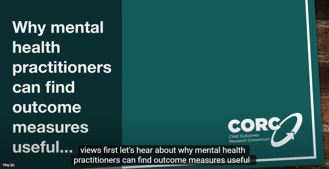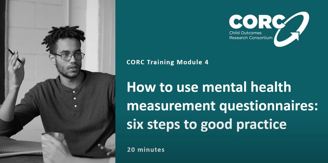Overview
CORE stands for “Clinical Outcomes in Routine Evaluation”. The CORE system comprises tools and advice to support monitoring of change and outcomes in routine practice in psychotherapy, counselling and any other work attempting to promote psychological recovery, health and wellbeing. They have a variety of measures.
The CORE-10 is a 10-item measure asking how a person has felt over the past week. It is a session-by-session monitoring tool with items covering anxiety, depression, trauma, physical problems, functioning and risk to self. the CORE-10 has six problem domain items, three functioning domain items and one risk item. The total score indicates a persons' level of psychological distress.
The Young Person's CORE (YP-CORE) is a 10-item measure designed for use with the 11-18 years age range.
There are 2 forms that have been developed for use with people with learning disabilities: LD-CORE-15 and LD-CORE-30.
The CORE-A is a separate information gathering framework designed to be completed by practitioners, to give context to the self-report measures. It comprises two forms; one to be completed at assessment and the other at end of therapy.
Terms of use
The Core System Trust (CST) holds the copyright to the CORE instruments. The instruments have always been free to reproduce on paper provided that they are not changed, that the reproduction is not for profit and copyright is acknowledged.
Any organisation is free to reproduce CORE instruments in software, as well as on paper. In line with all the measures are placed into the Creative Commons Attribution-NonCommercial-NoDerivatives 4.0 International (CC BY-NC-ND 4.0) licence
Scales / Subscales
All of the CORE measures can be found on the Core System Trust website: https://www.coresystemtrust.org.uk/home/instruments/
Quick link to the CORE-10: https://www.coresystemtrust.org.uk/home/instruments/core-10-information/
Quick link to the YP-CORE: https://www.coresystemtrust.org.uk/home/instruments/yp-core-information/
Quick link to the LD-CORE measures: https://www.coresystemtrust.org.uk/home/instruments/ld-core-information/
Quick link to the CORE-A: https://www.coresystemtrust.org.uk/home/instruments/core-a-taf-information/
Suitability
Core System Trust advise that:
- The CORE-10 is for people aged 17 and over.
- The YP-CORE is for young people aged 11-18. Psychometric properties and scores vary with age and gender as detailed in below sections.
- Currently, all UK CORE instruments use the binary gender classification “Male/Female” with no option for a different gender to be selected; there are future plans for this to be updated. Please see https://www.coresystemtrust.org.uk/home/faq/gender-classification-in-core-instruments/ for further information.
Please do get in touch at CORC@annafreud.org if you are aware of any information that may be of interest to users of the measure as we may be able to update our webpage to include it.
Administration
The questionnaires take between five and ten minutes to administer. In order to ensure that each item is understood by the respondent, or to gain additional information about each response, the questionnaires can be administered directly by a professional who can ask follow-up questions.
To get the most out of using these measures please consider how they will be used; we recommend taking a look at the following short videos made by CORC:


Working remotely with CORE
Electronically fillable versions of the CORE-10 and YP-CORE can be found here:
For more information of working remotely with outcome measures, please read our guide: https://www.corc.uk.net/outcome-experience-measures/using-outcome-and-experience-measures-remotely/
Scoring and Interpretation
Given the small number of items in each questionnaire, there are no individual subscales.
Scoring the CORE-10: Add together the item scores, divide by the number of questions completed to obtain the mean score, then multiply by 10 to obtain the clinical score.
It is not recommended that you compute a clinical score if more than one item has been omitted. Therefore if 9 items have been completed the clinical score can still be computed.
The below scores are taken from Connell & Barkham, 2007:
|
Clinical Score |
Interpretation |
|
0-5 |
Healthy |
|
6-10 |
Low level distress |
|
11-14 |
Mild psychological distress |
|
15-19 |
Moderate psychological distress |
|
20-24 |
Moderate to severe psychological distress |
|
25-40 |
Severe psychological distress |
CORE-10 clinical cut off score: 11 or above indicates clinically significant distress (Barkham et al., 2012)
Scoring the YP-CORE: Follow the same process as the CORE-10.
YP-CORE clinical cut off score: The clinically validated cut-off score changes dependent on age and gender. The below scores are taken from Twigg et al., 2016:
|
Clinical score |
Gender |
Age (years) |
|
10.3 |
Male |
11-13 |
|
14.1 |
Male |
14-16 |
|
14.4 |
Female |
11-13 |
|
15.9 |
Female |
14-16 |
Further scoring information is available on the CORE Systems Trust website - The Instruments : Clinical Outcomes in Routine Evaluation (and CST) (coresystemtrust.org.uk)
Psychometric properties
|
Property |
Definition |
Evidence |
|
Internal consistency |
Degree to which similar items within a scale correlate with each other. |
The CORE-10 has been shown to have good internal reliability with an alpha of .9 (Barkham et al., 2012). The YP-CORE has also been found to have good internal reliability with an alpha of .8 (Twigg et al., 2016). |
|
Construct validity |
Degree to which the questionnaire actually measures the specific trait or attribute it is intended to measure. |
Lewis (2016) reported the CORE-10 to have good construct validity following findings from a confirmatory factor analysis: “The six factor model had an RMSEA of .06 indicating a good fit between the hypothesised model and the data” (p.113).
|
|
Test-retest reliability |
Degree to which the same respondents have the same score after period of time when trait shouldn't have changed. |
Lewis (2016) reported the CORE-10 to have ‘moderate’ two-week re-test reliability (ICC=.83). Twigg et al. (2016) reported the YP-CORE to have ‘good’ one-week re-test reliability (r=.76).
|
|
Convergent validity |
Degree to which two measures of constructs that theoretically should be related are in fact related. |
Coates et al. (2019) reported the CORE-10 is correlated with the GAD-2 at .69 and with Whooley Questions at .64, showing moderate to strong convergent validity. |
|
Concurrent validity |
Correlation of the measure with others measuring same concept. |
A Finnish translation of the YP-CORE showed good concurrent validity against two widely used symptom-specific measures (r = 0.62-0.87) (Gergov et al., 2017) |
|
Discriminant validity |
Lack of correlation with opposite concepts. |
Lewis (2016) reported the CORE-10 to have good discriminant validity. |
Translation
There are a range of translated versions of the YP-CORE and the CORE-OM available, including Albanian, Croatian, Danish, Finnish, Italian, Portuguese, Romanian and Spanish. These versions can be accessed here –
https://www.coresystemtrust.org.uk/home/copyright-licensing/approved-translations/
There are no translated versions of the LD-CORE and CORE-A available.
Useful resources
References
Barkham, M., Bewick, B., Mullin, T., Gilbody, S., Connell, J., Cahill, J., Mellor-Clark, J., Richards, D., Unsworth, G. & Evans, C. (2012). The CORE-10: A short measure of psychological distress for routine use in the psychological therapies. Counselling and Psychotherapy Research, 1–11. http://doi.org/10.1080/14733145.2012.729069.
Biescad, M., Timulak, L. (2014). Measuring psychotherapy outcomes in routine practice: Examining Slovak versions of three commonly used outcome instruments. European Journal of Psychotherapy & Counselling, 16(2),140-162.
Briscoe, H., Ashworth, S., & Shelton, L. (2019). Establishing the concurrent validity of the clinical outcome in routine evaluation-learning disabilities scale. Advances in Mental Health and Intellectual Disabilities.
Coates, R., Ayers, S., de Visser, R. & Thornton, A. (2019). Evaluation of the CORE-10 to assess psychological distress in pregnancy. Journal of Reproductive and Infant Psychology, doi: 10.1080/02646838.2019.1702631
Connell, J., & Barkham, M. (2007). CORE-10 User Manual, Version 1.1. CORE System Trust & CORE Information Management Systems Ltd.
Di Bona, L., Saxon, D., Barkham, M., Dent-Brown, K. & Parry, G. (2014). Predictors of patient non-attendance at Improving Access to Psychological Therapy services demonstration sites. Journal of Affective Disorders, 169, 157-164.
Evans, C., Connell, J., Barkham, M., Marshall, C., & Mellor-Clark, J. (2003). Practice-Based Evidence: benchmarking NHS primary care counselling services at national and local levels. Clinical Psychology & Psychotherapy, 10, 374–388. http://doi.org/10.1002/cpp.384.
Gergov, V., Lahti, J., Marttunen, M., Lipsanen, J., Evans, C., Ranta, K., ... & Lindberg, N. (2017). Psychometric properties of the Finnish version of the Young Person’s Clinical Outcomes in Routine Evaluation (YP-CORE) questionnaire. Nordic journal of psychiatry, 71(4), 250-255.
Holmqvist, R., Philips, B. & Barkham, M. (2015). Developing practice-based evidence: Benefits, challenges, and tensions. Psychotherapy Research, 25(1), 25-31.
Horton, M., Wright, N., Dyer, W., Wright-Hughes, A., Farrin, A., Mohammed, Z., Smith, J., Heyes, T., Gilbody, S. & Tennant, A. (2014). Assessing the risk of self-harm in an adult offender population: an incidence cohort study. Health Technology Assessment, 18(64).
Jureša, V., Posavec, M., Latković Prugovečki, S., Musil, V., Majer, M., & Vidović Petričević, T. (2020). Adolescent mental health: analysis using YP-CORE test in School health services in Croatia. European Journal of Public Health, 30(Supplement_5), ckaa166-1057.
Kristjánsdóttir, H., Sigurðsson, B.H., Salkovskis, P., Ólason, D., Sigurdsson, E., Evans, C., Gylfadóttir, E.D. & Sigurðsson, J.F. (online pre-publication). Evaluation of the psychometric properties of the Icelandic version of the Clinical Outcomes in Routine Evaluation–Outcome Measure, its transdiagnostic utility and cross-cultural validation. Clinical Psychology and Psychotherapy.
Lewis, Gwen. Validating the CORE-10 as a mental health screening tool for prisoners. Diss. Cardiff University, 2016.
Magallón, E., Botella, L., & Evans, C. (2018). Adaptation and psychometric properties of the spanish version of the yP-CoRE (young Person’s Clinical outcomes in Routine Evaluation). Actas Esp Psiquiatr, 46(3), 75-82.
Marshall, K., Coiffait, F. M., & Willoughby-Booth, S. (2013). Assessing distress in people with intellectual disabilities. Learning Disability Practice, 16(3).
Mindel, C., Oppong, C., & Jacob, J. (2021). Exploring the experiences of young people completing the YP‐CORE to capture clinical need on a digital counselling platform. Counselling and Psychotherapy Research, 21(4), 923-933.
Murray, A.L., McKenzie, K., Murray, K.R, Richelieu, M. (online pre-publication). Mokken scales for testing both pre- and postintervention: an analysis of the Clinical Outcomes in Routine Evaluation—Outcome Measure (CORE–OM) before and after counseling. Psychological Assessment.
O'Reilly, A., Peiper, N., O'Keeffe, L., Illback, R., & Clayton, R. (2016). Performance of the CORE-10 and YP-CORE measures in a sample of youth engaging with a community mental health service. International journal of methods in psychiatric research, 25(4), 324–332. https://doi.org/10.1002/mpr.1500
Payne, N., Ciclitira, K., Starr, F., Marzano, L., & Brunswick, N. (2014). Evaluation of long-term counselling at a community health service for women who are on a low income. Counselling and Psychotherapy Research, 1-9.
Twigg, E., Barkham, M., Bewick, B.M.m Mulhern, B., Connell, J. & Cooper, M. (2009) The Young Person's CORE: Development of a brief outcome measure for young people. Counselling and Psychotherapy Research, 9 (3).
Twigg, E., Cooper, M., Evans, C., Freire, E., Mellor‐Clark, J., McInnes, B., & Barkham, M. (2016). Acceptability, reliability, referential distributions and sensitivity to change in the Young Person's Clinical Outcomes in Routine Evaluation (YP‐CORE) outcome measure: Replication and refinement. Child and Adolescent Mental Health, 21(2), 115-123.